| |
"Did you get the dough?"
"I got a hunch, Ma."
"Pipe down or you'll get it too."
"Any time I want anything from you I'll take it, see?"
"Back up and keep your trap shut or I'll let you have it!"
"You crazy rat, you croaked him!"
"Don't wake the dame."
"If I think you're lying then I'll give you the works."
"I'm sorry, Slim, this is curtains." |
| |
A small selection from the American gangster dialogue that peppers
the 1948 British-made crime movie, No Orchids for Miss Blandish |
No Orchids for Miss Blandish is a film I became aware of early in my love affair with cinema, thanks primarily to the critical shitstorm it provoked on its release. It was one of those titles whose fame was almost solely down to the controversy its content had managed to stir up. Critics were outraged by its violence and its amoral sexuality, and in Britain the fact that it was awarded an ‘A' certificate – which meant that children could see it as long as they had an irresponsible adult with them – just made matters worse. As a young cinemagoer I was always drawn to films like this, but No Orchids for Miss Blandish was a tricky one to find in pre-home video days. When I did track it down, I knew I'd have to make allowances for the fact that what shocked critics back in 1948 was unlikely to have audiences shuddering in disgust decades later. I was also cautiously aware that the critical consensus was that as a film entertainment, No Orchids for Miss Blandish was a bit of a stinker.
It opens in the manner of a low-rent Douglas Sirk melodrama. A bouquet of orchids is prepared in a flower shop and transported to the residence of the titular Miss Blandish by a uniformed fop who pauses only to buy a paper with the expositional headline "Blandish heiress to marry." On reaching his destination, the fop hands the flowers to a sniffily upmarket doorman, who passes them on to a walking fossil in a butler's uniform. He carries them upstairs and hands them to a maid whose uniform includes an expression of snooty disdain. Every time these flowers change hands they do so with the spoken line, "Orchids for Miss Blandish." When the Miss Blandish in question – whose first appearance in frame is announced by a sudden burst of romantic music – is presented with the flowers, she places the card that came with them into a box with several others of its ilk and responds, in that terribly well-to-do voice that afflicts only the English gentry, "Tell them, ‘No Orchids for Miss Blandish'." Right, that's the title taken care of at least.
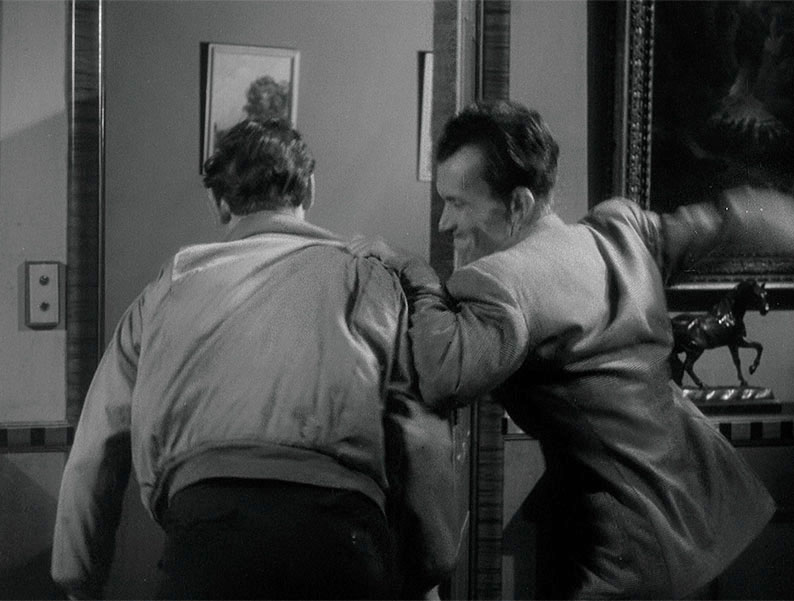
The film is set in New York but was actually shot in England by a British production company and a British director and crew, which is not an issue if the deception is successful and I certainly saw nothing that looked glaringly out-of-place. There are a fair few characters introduced in the opening twenty minutes or so, some of whom aren't named, and you'll need to stay focused or you'll soon find yourself wondering what the hell is going on. First up we have Blandish's English-accented housemaid, who has her eyes on her employer's fur coat, a fact she makes sure her hard-up boyfriend Johnny is aware of. As they talk and snog they overhear Blandish (we never learn her first name) talking to her fiancé Foster, whom she clearly isn't marrying out of love or desire. As they chat, they reveal that the following evening they're due at some swish reception or other, and that Foster wants to cut out early and take Blandish somewhere livelier where "the ice will melt in your veins and you'll want me as much as I want you." A speakeasy with a sauna, perhaps? Blandish will also be wearing her mother's necklace that evening, an engagement present from her wealthy father that we later discover is worth a small fortune.
The enterprising Johnny reasons that this information might be worth a few bob if dropped in the right ear, so the next day pays a visit to Ma, the matriarchal head of the notorious Grisson gang. What this dopey bugger fails to realise is that the necklace is the lead headline in that morning's newspaper, a journal that Ma has sitting on her desk. For wasting their time, Ma has her chief goon Eddie beat him up and throw him out. And Eddie really hits him, then does again for good measure when he gets up. It's here we get the first suggestion that there really would have been trouble if Ma's son Slim had been here. We'll be hearing more about him before we meet him.
Later the same day, Johnny approaches two low-level hoodlums named Riley and Bailey in a bar with the same info and they seem genuinely interested in the idea of stealing the necklace, but insist that the reluctant Johnny comes on the job with them. We get to know these two a little before they depart, thanks in part to an acrimonious conversation they have with annoyingly self-satisfied journalist Fenner, a conversation Bailey has with his tarty girlfriend Anna, and a casual visit paid to the bar by Eddie, who treats the two men like something he has scraped off his shoe. Both Bailey and Riley are intimidated by Eddie, but what really scares them is the prospect of having to deal with Slim. By this point the still unseen Slim was starting to feel like a cross between Samuel Beckett's Godot and Doug from Monty Python's Dinsdale Brothers sketch.
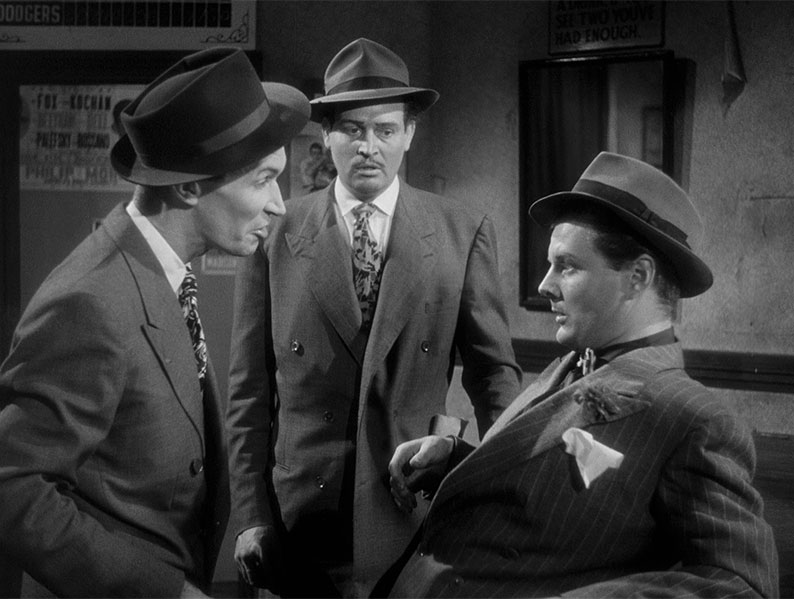
Bailey intimates that the mouthy Riley is a bit of a loose cannon, something confirmed when he smashes a glass flask over the head of lippy barman Ted. Thus, when he and Bailey ambush Foster and Miss Blandish on a quiet stretch of road and the drunken Foster punches him on the jaw, you just know it's going to end badly for this particular young man. Quite how badly even I wasn't ready for. Instead of retrieving his dropped gun, Riley gets to his feet, knocks Foster to the ground and starts clubbing him repeatedly over the head with a cosh (the blows make contact just out of shot, but still…), eventually moving on to angrily kicking what we discover is Foster's now lifeless body. Apparently this sequence was the result of a costly reshoot after the BBFC objected to the brutality of the scene as it originally stood. That I'd like to see. Actually, I'm not sure I would. Anyway, when Riley lets rip, Blandish understandably freaks out, and in what may be the most telling dialogue exchange in a film that doesn't have many, she screams at Bailey, "Stop him!" to which Bailey uncomfortably responds, "I can't." Nice. Johnny, meanwhile, has been watching all this from the car, and after Foster is dead, he quietly retrieves Riley's gun and shoots him dead with it. Bailey responds by shooting and killing Johnny, then bundles the punched-out Blandish into his car and drives away.
After stopping at a gas station and having a phone call to Anna interrupted by the unexpected arrival of Eddie (I'll have more to say on this in a minute), Bailey takes Blandish to a ramshackle old something-or-other owned by the alcoholically damaged Barney, to whom he agrees to give a cut of his haul once he sells the Blandish necklace. The Grissons, however, suss out that Bailey is the one who has kidnapped the missing heiress and in no time at all, a party consisting of Eddie, brutish goon Flyn and the more cultured Doc roll up at Barney's door. They demand to see Blandish, who at this point is upstairs being raped by Bailey, at least that's the inference. Sorry, when was this made again? By the time Bailey makes an appearance, the by-now notorious Slim has finally shown his face, and instead of obsessively playing with a knife as he does in the book, he just sits there tossing loaded dice noisily onto a plate. This doesn't sound like much but it clearly has the power to drive frightened people insane. On entering the room, for example, Blandish walks nervously over to Slim and has an explosion of hysteria so sudden and so violent you'd think she'd been electrically shocked. Slim all but ignores her and carries on tossing the dice, which prompts the agitated Bailey's voice to rise to fever pitch and the silly bastard then pulls a gun and tries to shoot Slim. Care to guess how that goes? Slim then takes Blandish to the gang's nightclub and stashes her there. While he gives the only detective in town the run-around, Ma and Doc make plans plan to pin the whole thing on the now buried Bailey and reason that they'll also have to dispose of the girl. This news sends Slim into a mutinous fury, and when Ma protests he tells her in no uncertain terms that he's running the gang now and that she'll do as she's told. He then pays a visit to Blandish, hands back her necklace and tells her she can leave.
And then they fall in love.
What?
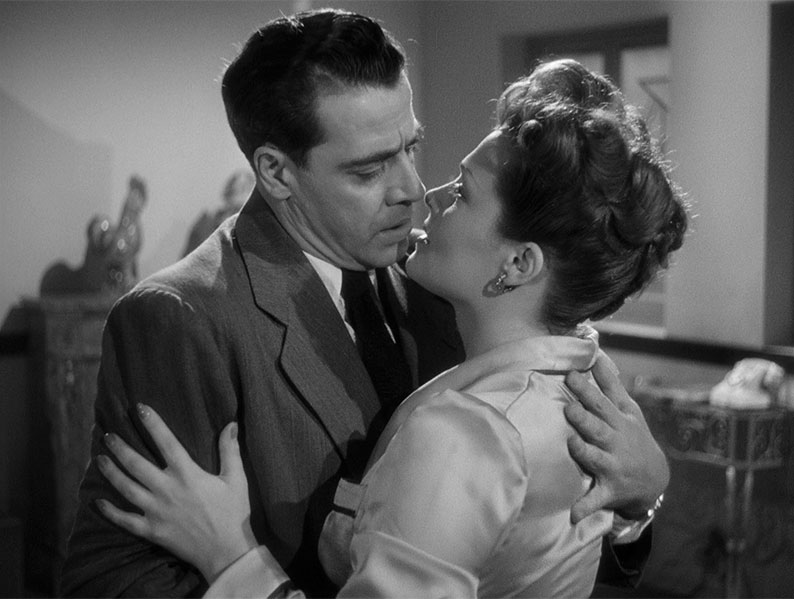
OK, on reflection this is not quite as preposterous a plot twist as I've made it sound, despite playing as such and veering violently from how the story played out in the novel, where Blandish remained an unwilling and terrified prisoner, with whom the psychotically obsessed Slim has his evil way by having her beaten and plied with drugs by Ma. Not quite as romantic, huh? It turns out here that Slim is the one who has been sending orchids to Blandish and by this point she knows it. It's also worth considering that she was clearly unhappy with the idea of marrying Foster, who does come across as a bit of a twerp, and maybe, just maybe, felt suffocated by her cosseted existence. Oh, the poor dear. But think about it for a second. This ever-so-English young woman, one who has led the sort of sheltered existence that only the landed gentry can afford, has in the past 24 hours watched her fiancé get clubbed to death, his killer shot dead and the killer of his killer murdered, then was kidnapped and raped and then saw her rapist killed, only to be kidnapped and held prisoner all over again. Yet her response to being offered her freedom is to put this trauma-inducing series of events aside and run into the arms of the most feared hoodlum in town and passionately kiss him. Just a few seconds of screen times later they're like an old married couple and calling each other ‘darling', a behavioural convention that tends to wheedle its way into the lives of couples over time, not get thrown around willy-nilly after just one night together. Of course, this situation does present Slim with a problem, as he's fallen for a girl whose disappearance could land his organisation in a big pile of trouble if they get tied to her kidnapping. He thus has to balance his passion for Blandish with his sense of family loyalty and self-preservation, a conflict of interest with which none of his fellow gang members seem to be afflicted.
Despite my all-too-characteristic flippancy, I'm going to go out on a limb here and suggest that No Orchids for Miss Blandish is nowhere near as bad as its hostile critical reception has made it out to be. And it really is hard to exaggerate just how much contemporary critics hated this movie. Collectively dismissed in the UK as the worst film ever made, the venerable Monthly Film Bulletin described it as "the most sickening exhibition of brutality, perversion, sex and sadism ever to be shown on a cinema screen." Maybe it's the passing of time and perhaps it's my fondness for movies that others tend to regard as trashy, but while there's plenty here that made me roll my eyes in disbelief, there are also things about it that I have to admit I rather liked.
The fact that this cast of New York hoodlums is comprised of primarily Canadian and British actors is not the cultural handicap that some have suggested. American leading man Jack La Rue certainly fits the part, the Canadians sound American for most of the time (some are only given away by distinctively Canadian pronunciation of the odd word or two) and most of the British actors asked to fake an American accent tend to get by. A couple of the bit players are painfully unconvincing, but I found it surprisingly easy to buy Danny Green as burly bruiser Flyn and a young Sid James as bartender Ted. Quite where Ma is supposed to be from is teasingly uncertain (actress Lilli Molnar was born in Hungary and makes no attempt to disguise her accent), while the ghost of Casablanca's barman Sascha hangs over head waiter Louis, who's as French as a baguette and is clearly intended to be the film's comedy relief. I rather liked him, as it happens. He's certainly easier to tolerate than then the club's resident comic.
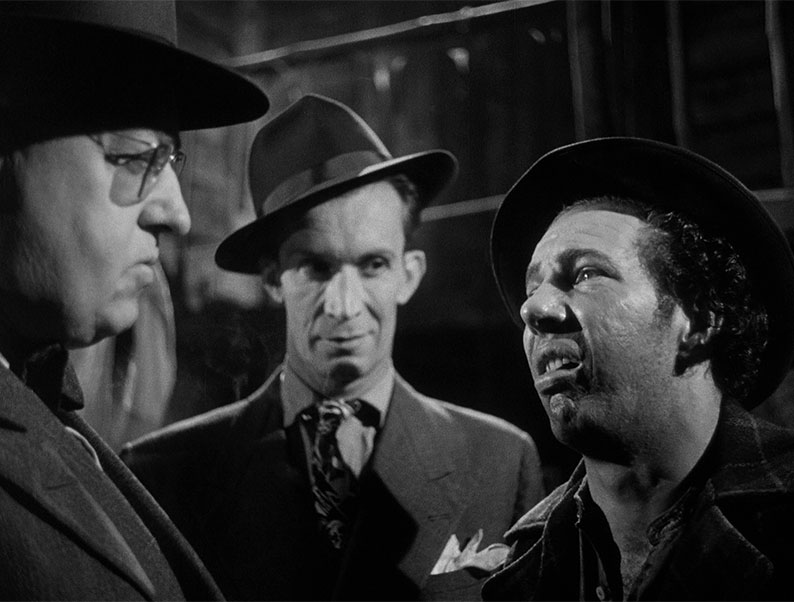
The dialogue, it has to be said, is a key offender here, being often as tacky as those top quotes suggest. The apocryphal claim that novel author James Hadley Chase had a book of American slang on his desk for reference while he was writing sure makes sense here, so liberally are clichés of the gangster genre thrown about, sometimes in the manner of a Mel Brooks-style parody. Just occasionally, however, a small gem emerges. My favourite comes when the Grisson men press Barney to come clean about the whereabouts Bailey and Blandish, and struck-off medico Doc calmly asks him, "And how are the gallstones? You know, Eddie, I think I ought to operate. I'm certain I could remember where gallstones are." He then adds for emphasis, "Course, it's a pity I haven't any anaesthetic…" That does the trick. There are also a couple of instances where the colourfully named St. John Legh Clowes' sometimes pedestrian direction (he produced the stage version but never made another movie) is livened up a little by a telling facial close-up, the best of which comes after Riley is punched by Foster, which plays as a suitably "oh shit" foretaste of the violence to come.
There is, however, still plenty here to have you shaking your head in disbelief. Even by gangster movies standards, women get a really raw deal here. They suffer verbal and physical abuse at the hands of boyfriends who often treat them as nothing more than a convenient nuisance, and they swap partners in a heartbeat or jump into bed with a man they've just met when the circumstances suit them. Characters also tend to drop in and out of the story and only superficially fill roles that would normally have real narrative value. Reporter Fenner is the biggest offender here, appearing early to feed the audience titbits on Riley and Bailey and only putting his journalistic hat on once the story is already thundering to some sort of conclusion. He then does little except lean on a witness who is then shot and killed and sleep with the showgirl that Slim dumped for Blandish. She's really up for it, of course.
A few of the plot points are so contrived that I found myself looking for hidden meaning where it turns out there was none. Eddie in particular is an absolute master of the chance encounter. When he turns up at Ted's bar while Johnny is working, I initially presumed it was because he had been following him, even though he had received no orders to do so. Thus when he shows up at a gas station at which Bailey has stopped to call Anna and top up on fuel, I assumed he was still on Johnny's trail and had followed Bailey after the boy was killed. Except it turns out he knows nothing about the shooting and doesn't even suss that the classy but unconscious woman in Bailey's car is the heiress whose diamonds Johnny had earlier suggested they steal. After a few snarky comments, he thus heads on his way, only to recall this encounter later when the plot needs the Grisson mob to track Bailey down. This means that he just happened to be in that out-of-the-way spot late at night just as Bailey ran low on fuel, just like he happened to coincidentally wander into Ted's bar while Johnny was fixing the gambling machine and Riley and Bailey were getting tough with Ted. Do me a favour.
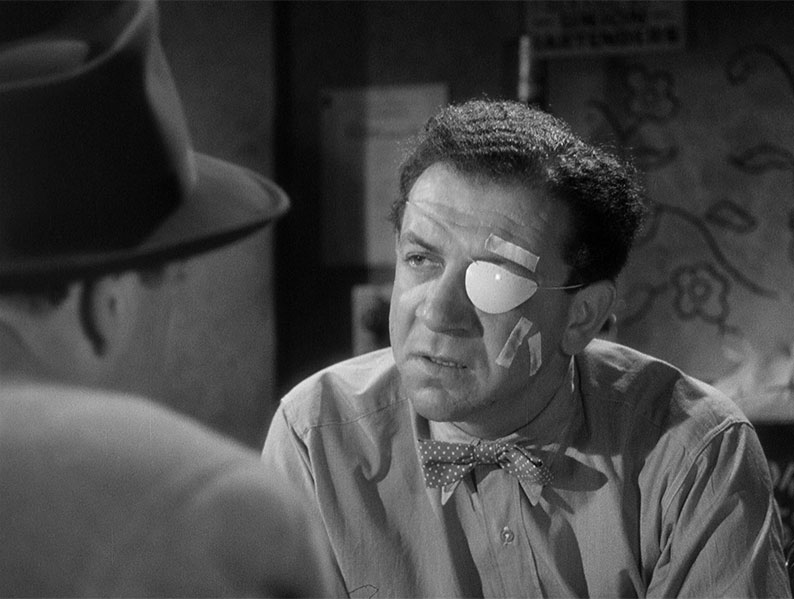
For all its small pleasures, No Orchids for Miss Blandish does play for much of the time like a clunky composite of gangster motifs and clichés, and is hampered further by a scattershot narrative, improbable plot twists, cartoon characters and no sense of its own identity. It dispenses with the psychotic and sadistic characteristics that made the Slim of the novel such a dangerous creation and transforms his imprisonment and abuse of the drugged and unwilling Blandish into an unlikely love story. But something about it keeps you watching regardless and it really is a hard film to seriously dislike. The brutality of its violence and its implied sexuality (I've not mentioned the moment when Slim's pre-Blandish girlfriend takes his and asks seductively, "Why don't you soften up and give me a tumble?") have rightly earned it a place in cinema history, its best moments are better than its reputation suggests, and its ending is as dark as anything you'll find in the gloomiest recesses of film noir. It's often shambolic, sometimes unintentionally funny, but is still an oddly intriguing work that I ended up really warming to. I have a sneaking feeling that Indicator knew exactly what it had on its hands here and just what the film's offbeat appeal would be, and should thus be congratulated for taking a chance on a movie that, notorious though it is, probably won't be on too many birthday lists.
It's an Indicator Blu-ray. What more do you need to know? Oh, alright. The disc features a 1080p 1.37:1 transfer from an HD remaster carried out by Screenbound, and it's in excellent shape. The contrast range is really well balanced here, getting the black levels right but never feeling overly harsh and allowing detail to shine through even in darker scenes. The image is sharp and dust and damage have been largely banished. And yes, the sort of fine grain that keeps film looking like film is visible throughout.
The Linear PCM 1.0 mono soundtrack is also clean of damage and any distracting background hiss. There's a slightly tinny feel to the dialogue and music, with little in the way of bass and higher pitched sounds that just occasionally grate, none of which is unusual for a film of this age.
Subtitles for the deaf and hearing impaired can be activated if you need them.
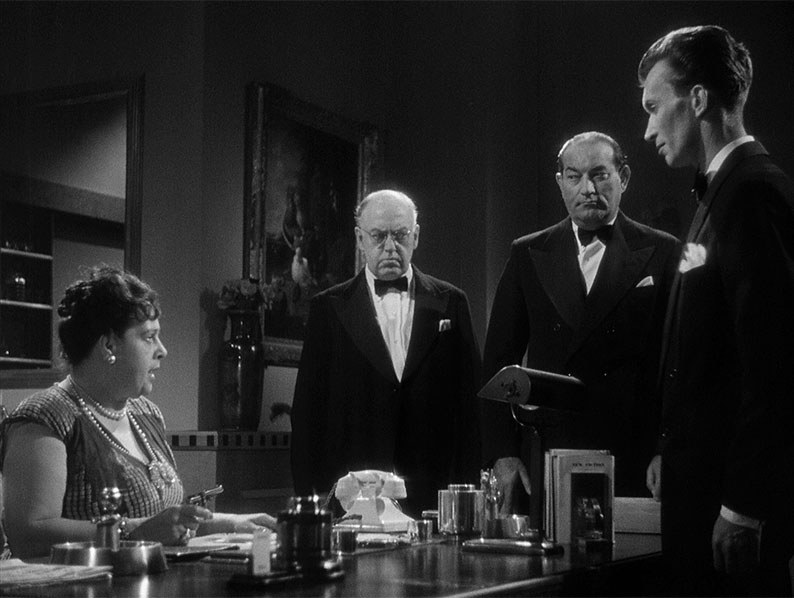
It should be noted that when you go to play the film you're given the option to watch the original English version or the American release, which was retitled Black Dice. In his interview on this disc, the film's American distributor Richard Gordon claims the film was recut over a period of two years in America before it was released and was only shown its original edit there in 2009. From what I can tell, however, the only difference between the two versions here is the opening title sequence, but I've yet to commit every shot to memory so could be wrong on this. The scenes I expected to be cut are certainly the same on both versions.
Interview with Richard Gordon and Richard Neilson (34:09)
Produced for an earlier American DVD release, this 4:3-framed featurette sees a cheery Joel Blumberg interview film producer Richard Gordon, who took on the task of distributing the film in America, and actor Richard Neilson, who played the psychotic Riley. Both were born in Britain, but Gordon long ago moved to America and has lost most of his English accent, something the entertaining Neilson wears with aplomb. Gordon talks about the difficulties of getting the film passed for American release, the original choices for the film's lead roles and becoming a producer of horror movies. Neilson discusses faking an American accent and his repertory theatre background, and has an engaging story about why he nearly wasn't in the film and another about performing in the stage version with Robert Newton. Both men express their dismay at the violence in modern movies, a tad ironic given that they're being interviewed because of their involvement in a film that was condemned for its excessive violence.
Miss Blandish and the Censor (41:11)
Ex-BBFC examiner Richard Falcon provides exactly the sort of background detail on the film and the book that anyone who is new to either could want. He highlights some of the differences between the two and provides specifics about the issues the film had with the British censor, the press and even the Home Office. Obviously save this for after the movie, but it's well worth watching.
Theatrical Trailer (2:06)
A breezy sell that doesn't shy away from the snogging or the violence of a film that, we are assured, "is definitely NOT for the lily-livered!"
Black Dice Trailer (1:42)
A trailer for the retitled American release that warns the audience that "You gamble with death when you bet on Black Dice." Not the best advertisement for Las Vegas casinos.
Image gallery
25 screens of publicity photos, nauseatingly coloured front-of-house stills, magazine articles and posters.
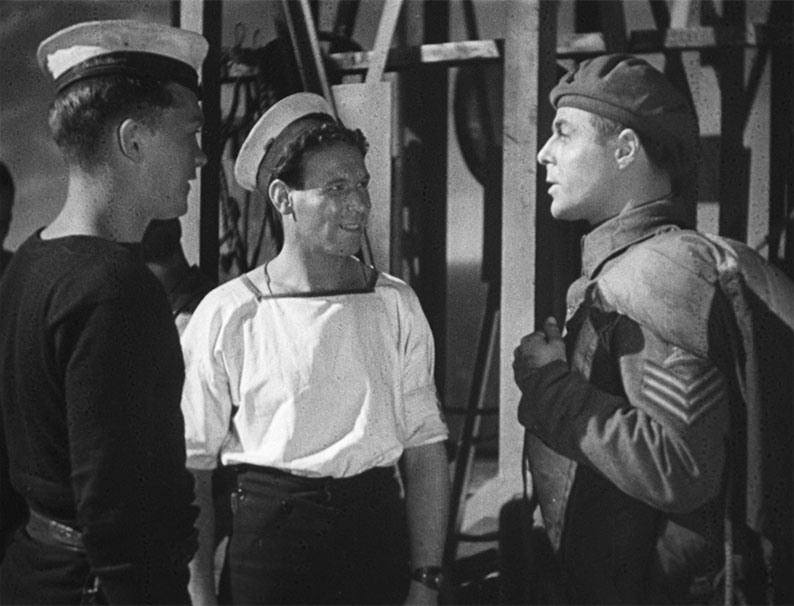
Soldier, Sailor (1945) (49:26)
Included here solely because it was written by No Orchids director St. John Legh Clowes, this wartime docudrama made for the Ministry of Information is of real interest, despite having next-to-nothing in common with the feature it accompanies. Rather than telling a traditional story, the focus here is on life aboard a Defensively Equipped Merchant Ship (aka DEMS) during World War 2, one that becomes separated from its convoy when a pump breaks down and is attacked by enemy ships and planes once it gets on the move. Central to the film is a friendship between a Petty Officer and an Army Sergeant, who in the film's opening scene are rescued after being washed ashore in Libya following the sinking of their previous vessel. The performances probably didn't win any awards but there's a documentary realism to much of the footage that is genuinely arresting at times, the result of some serious naval cooperation. The character detail is also noteworthy, particularly a scene in which a group of sailorbs and soldiers muse on the propect of returning to the civilian careers they left when they joined up, and I did like the bolshi socialist who passes his time trying to convince his crewmates of the injustices of capitalism, a little foretaste of how the poolitical landscape qwould change after the war. Pleasingly, this also has optional subtitles for the hearing impaired.
Booklet
Oh I do love Indicator's booklets and this one is well up to scratch. It opens with full credits for the film and an essay by Emeritus Professor in Film at De Montfort University Robert Murphy on the story's journey from novel to stage and then to screen, and includes a persuasive look at some of the film's better qualities. Following this is a fascinating examination of the novel, which was rewritten by its author James Hadley Chase in 1961 to update what he felt were outmoded elements (this is the version I've read). A number of passages from each version are compared to highlight the differences between this rewrite and the 1934 original, and they are sometimes quite startling (the killing of Riley is way more gruesomely explicit in the original). Also included here are extracts from George Orwell's 1944 essay, Raffles and Miss Blandish, where the esteemed author expresses admiration for Chase's talent as a writer but has concerns about the book's normalisation of brutality and corruption. Two scans of newspaper supplement pages on which the film is discussed are followed by a piece for the 1948 issue of Life that takes a slightly mocking view of the controversy the film provoked on its London release, and is titled rather wittily, London Can't Take It! There are some scathing extracts from three contemporary reviews, and rounding things off are the credits for Soldier, Sailor and a welcome piece on this film by Michael Brooke.
What more to say about No Orchids for Miss Blandish? I'm not going to claim it's a great or even good film, but it's more entertaining than contemporary reviews (and even a few since) have ferociously suggested, though not always for the intended reasons. I certainly enjoyed it, and Indicator have done it proud with a strong HD transfer and some fine film-related extras. Best of all, however, is the inclusion of Soldier, Sailor, a film most of us would never otherwise have seen, and the typically excellent booklet. Dammit, I just have to recommend this disc, but know what you're getting into.
|